President Biden is making back-and-forth trips between the White House and his home state of Delaware on Friday, racking up costly flight time.
Mr. Biden flew to Delaware on Thursday to participate in a town hall at the National Guard center in New Castle to tout newly expanded veterans benefits, only to make the pricey return trip to the White House on Air Force One on Friday afternoon, before being scheduled to head back to his home turf seven hours later.
The president has continued to rack up miles on his frequent trips to Delaware during his time in office.
As of mid-October, Mr. Biden had spent more than a quarter of his time in office on getaways to his home state, surpassing former President Donald Trump’s highly criticized time away from the White House.
Trips to Delaware became a key part of “Amtrak Joe’s” persona throughout his career in the Senate. He was known to dash out of Washington nearly every night to go back to his home state once the upper chamber gaveled out for the day.
But a trip back home for a sitting president requires significantly more planning and coordination among the horde of White House staff and a Secret Service detail always in tow.
The trips can also be expensive.
The cost of a one-hour flight on Air Force One is $180,118 — accounting for fuel, flight consumables, repairs and maintenance — according to a 2016 Air Force disclosure in response to a Freedom of Information Act request by the conservative watchdog Judicial Watch.
The Air Force One hop from Washington to Wilmington clocks in at less than an hour, and the president has a range of other travel options at his disposal, including a smaller, modified version of the iconic Boeing 747 that costs significantly less to operate, running just $15,846 per flight hour to operate.
But other costs, especially for the added security, quickly add up.
A 2019 Government Accountability Office Report analyzing four trips to Mar-a-Lago early in Mr. Trump’s term tallied $13.6 million in taxpayer expenses for Department of Defense and Secret Service operational and temporary duty costs. That’s about $3.4 million per trip.
The GAO report identified approximately $60,000 in expenses paid to Mr. Trump’s Florida resort in those four trips, including $24,000 in lodging expenses for DOD personnel and $36,000 for “space required by the Secret Service for operational purposes.”
The costs associated with trips to Mar-a-Lago also included other factors, including Coast Guard security of the surrounding waterways, that would likely not apply to Mr. Biden’s trips to Delaware. As such, costs associated with Mr. Biden’s travel could be significantly lower.
White House press secretary Karine Jean-Pierre told reporters on Thursday that Mr. Biden was returning to Washington to attend meetings and participate in holiday merrymaking before flying back at 8:55 p.m.
Mr. Biden said in his address Friday in Delaware that the return trip was so he could “sign a few pieces of legislation” and attend a White House reception.
A White House official told The Washington Times that Mr. Biden will sign Congress’ stopgap funding bill to fund the federal government through Dec. 23 during his brief stopover Friday.
Mr. Biden signed the bill without fanfare shortly after returning to the White House.
The president’s public schedule did not reference the bill signing, nor does it mention any reception.
The Senate approved the temporary funding legislation Thursday night, in addition to giving final passage to Congress’ annual defense policy bill, which includes a measure to repeal the president’s COVID-19 vaccine mandate for members of the military.
The White House has remained mum on whether he intends to sign the defense bill into law.
“The president still supports the secretary of defense’s position that repealing the mandate is not in the best interest of our troops,” National Security Council spokesman John Kirby told reporters Friday. “It’s not in the best interest of our military. It is a health and readiness issue.”
He added that while the president views the repeal as “a mistake,” he also “believes that it’s important to fund our military.”
• Joseph Clark can be reached at jclark@washingtontimes.com.




Please read our comment policy before commenting.